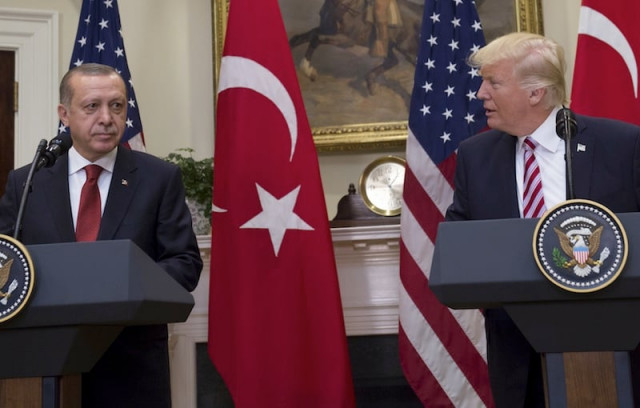Northeastern Syria: Turkey finds itself in a quandary
With the US, in another U-turn, coming out strongly against Turkish intervention

US President Donald Trump and Turkish President Recep Tayyip Erdogan (PHOTO: AFP)
The stage was set for this adventure by United States (US) President Trump when he announced a week back that US troops in the area were being pulled back. In a subsequent telephonic conversation with the Turkish President, he implicitly gave his consent for a Turkish invasion, granted with certain conditions.
Trump’s announcement caused a stir in the ranks of the Kurds who had been fighting alongside the US forces against the militant Islamic State (IS) fighters for the last five years. Abandoning the Kurds, after they lost thousands of their people to fighting ISIS was seen as an act of betrayal. The US position, vacillating and wavering, has sent disturbing signals to its allies not only in the region but across the world.
Turkey hopes to gain complete control of a strip of land along the Syrian border, about 40 kilometres in-depth, which would become a de facto Turkish territory. President Erdogan, by launching the attack, has unleashed a new conflict in an already troubled region. The Syrian conflict has raged on for years. More than half the country’s population has been uprooted from their homes. Tens of thousands have fled to Lebanon and Jordan and more than three million have sought shelter in Turkey.
Russian forces and Iran’s militias are helping the besieged Syrian Government of Bashar Al Assad in the face of vast swarms of militant groups operating in the area with diversified agendas and goals.
Turkey’s military intervention would have profound destabilising implications for the area. ISIS or Daesh, that has almost been eliminated, would certainly try to regroup taking advantage of their main rival, the Syrian Democratic Forces (SDF), battling Turkey’s military. ISIS could not have asked for more. The force which confronted them for more than five years is suddenly engaged on another front. The dreaded militant outfit would now seek to reimpose its ideology and spread terror in a region it had lost to the Kurdish militia.
The Turkish onslaught would also force, according to independent observers, close to one million people to leave their homes and seek shelter in safer zones. This would create a humanitarian crisis of grave proportions at a time when weather conditions would make things worse for fleeing families.
The Turkish occupation of part of the Syrian territory would set up a dangerous precedent in a region plagued by constant and unceasing wars by proxies of regional countries. Russian and Iranian forces operating in the area would not remain silent spectators of this conflict as their interests and goals begin to clash with those of Turkey. The Kurdish forces, frustrated by the US change of stance, have now joined hands with the Syrian Government forces to repel the Turkish invasion of their land. This has added another ominous dimension to an already complex and confusing scenario.
Turkey would certainly come under intense pressure from its European allies. Some EU countries have already made their position clear by suspending deliveries of weapons to Turkey.
But now the US, in another U-turn, has come out strongly against the Turkish intervention. It has decided to suspend talks on a trade deal with Ankara and has also imposed sanctions on some top leaders of Turkey. Perhaps Ankara did not anticipate such an abrupt reversal of policy by Washington. It did not exactly calculate that the losses of this adventure would outweigh the gains and Turkey would end up being a net loser.
Turkey’s fears of an independent Kurdish state taking roots are understandable given the fact that Kurds constitute some 18% of Turkey’s population. But there would be many other options on how to deal with the resurgent Kurdish nationalism sweeping the region.
In the larger regional perspective, the military incursion could cause more destabilisation, more conflicts and more human displacement and more suffering. Such a scenario will create unanticipated chaos and destruction. Hopefully, Ankara would stop its juggernaut before more ominous thresholds are crossed.
Published in The Express Tribune, October 17th, 2019.
Like Opinion & Editorial on Facebook, follow @ETOpEd on Twitter to receive all updates on all our daily pieces.














COMMENTS
Comments are moderated and generally will be posted if they are on-topic and not abusive.
For more information, please see our Comments FAQ